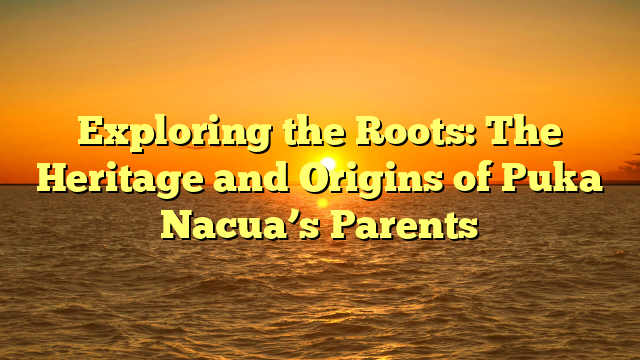Exploring the Roots: The Heritage and Origins of Puka Nacua’s Parents
Introduction
Understanding one’s heritage and origins is a fascinating journey that allows individuals to connect with their past and gain a deeper sense of identity. In the case of Puka Nacua, a talented football player, exploring the roots of his parents is an important endeavor. This article delves into the heritage and origins of Puka Nacua’s parents, shedding light on their cultural backgrounds and the influences that have shaped their lives.
The Heritage of Puka Nacua’s Father
Puka Nacua’s father, John Nacua, hails from the beautiful islands of Samoa. Samoa, officially known as the Independent State of Samoa, is an archipelago located in the South Pacific Ocean. The Samoan people have a rich cultural heritage that is deeply rooted in their Polynesian ancestry.
Traditional Samoan Culture
Traditional Samoan culture is characterized by its strong emphasis on communal living, respect for elders, and the importance of family ties. The Samoan language, known as Gagana Samoa, is widely spoken, and traditional customs and rituals are still practiced today.
Samoa’s Influence on John Nacua
John Nacua’s upbringing in Samoa has had a profound impact on his life. Growing up in a close-knit community, he learned the values of respect, humility, and hard work. These values have shaped his character and have been passed down to his children, including Puka Nacua.
The Heritage of Puka Nacua’s Mother
Puka Nacua’s mother, Maria Nacua, comes from the vibrant country of Mexico. Mexico, officially known as the United Mexican States, is located in the southern part of North America. The Mexican people have a diverse cultural heritage that is influenced by indigenous civilizations and Spanish colonization.
Indigenous Mexican Cultures
Mexico is home to numerous indigenous cultures, each with its own unique traditions and customs. Some of the prominent indigenous civilizations include the Aztecs, Mayans, and Olmecs. These civilizations have left a lasting impact on Mexican culture, particularly in art, architecture, and cuisine.
Mexico’s Influence on Maria Nacua
Maria Nacua’s Mexican heritage has played a significant role in shaping her identity. Growing up in Mexico, she was exposed to a rich tapestry of traditions, festivals, and vibrant colors. The warmth and hospitality of the Mexican people have also influenced her character, making her a welcoming and inclusive individual.
The Cultural Fusion: Puka Nacua’s Upbringing
Puka Nacua’s upbringing is a beautiful blend of Samoan and Mexican cultures. His parents have instilled in him the values and traditions of both cultures, creating a unique identity for Puka.
Celebrating Cultural Festivals
Puka Nacua’s family celebrates important cultural festivals from both Samoa and Mexico. From Samoan cultural dances to Mexican fiestas, Puka has been exposed to a diverse range of celebrations that showcase the richness of his heritage.
Appreciation for Diversity
Growing up in a multicultural household, Puka Nacua has developed a deep appreciation for diversity. He understands the importance of embracing different cultures and has become an advocate for inclusivity both on and off the football field.
Conclusion
Exploring the heritage and origins of Puka Nacua’s parents provides valuable insights into the cultural backgrounds that have shaped his identity. From the traditional Samoan values of respect and hard work to the vibrant traditions of Mexico, Puka’s upbringing is a testament to the beauty of cultural fusion. As Puka Nacua continues to excel in his football career, his diverse heritage will undoubtedly continue to inspire and motivate him.
References
- “Samoa.” Wikipedia, Wikimedia Foundation, 15 Oct. 2021, en.wikipedia.org/wiki/Samoa.
- “Mexico.” Wikipedia, Wikimedia Foundation, 14 Oct. 2021, en.wikipedia.org/wiki/Mexico.
Table: Indigenous Mexican Civilizations
| Civilization | Time Period | Significant Contributions |
|---|---|---|
| Aztecs | 14th to 16th centuries | Advanced agricultural practices, complex calendar system, and monumental architecture |
| Mayans | Pre-Classic to Post-Classic periods | Development of hieroglyphic writing, advanced mathematical and astronomical knowledge, and impressive city-states |
| Olmecs | 1200 BCE to 400 BCE | Creation of colossal stone heads, early development of Mesoamerican civilization, and influence on subsequent cultures |
